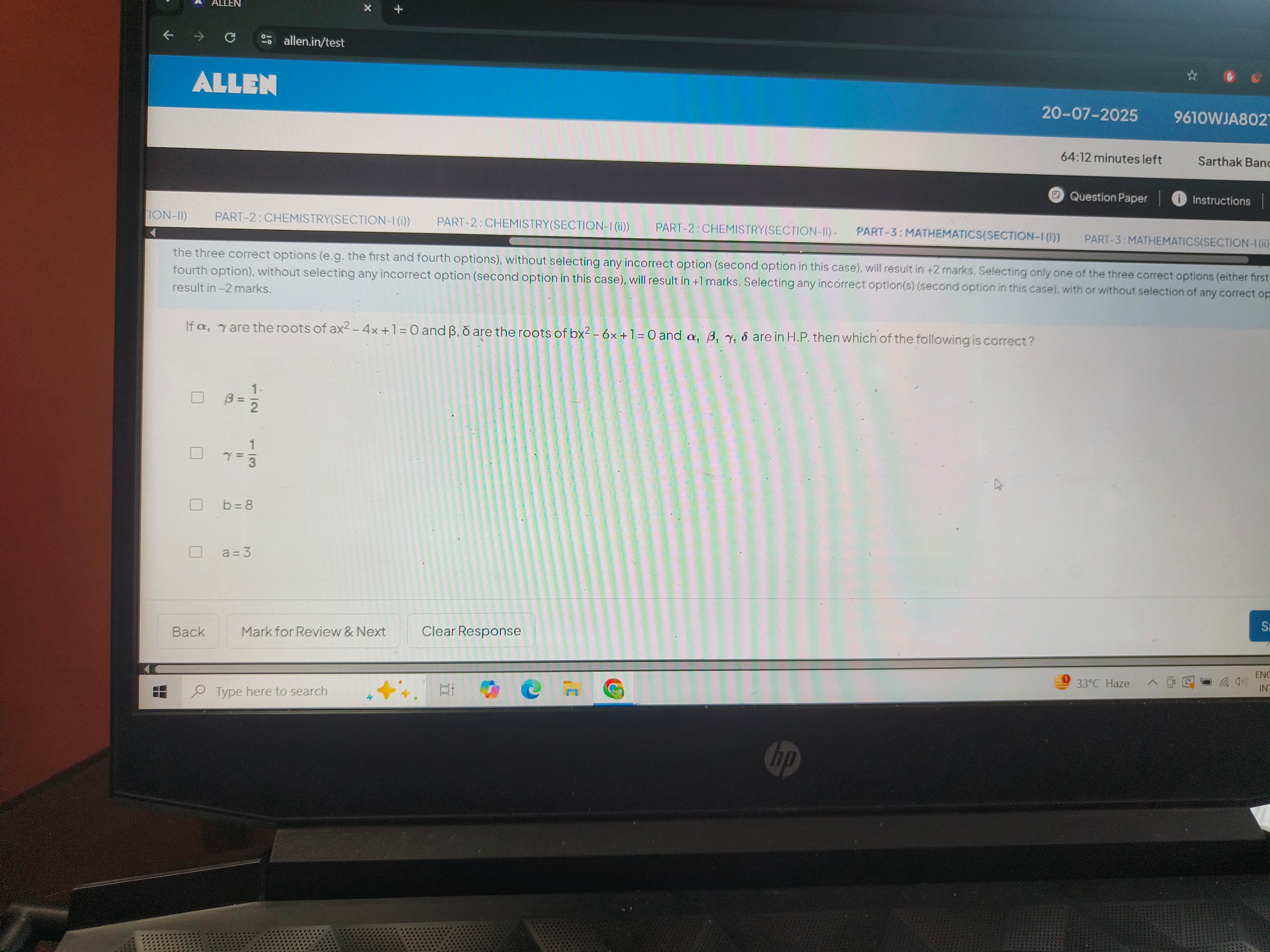Question
Question: If $\alpha$, $\gamma$ are the roots of $ax^2 - 4x + 1 = 0$ and $\beta$, $\delta$ are the roots of $b...
If α, γ are the roots of ax2−4x+1=0 and β, δ are the roots of bx2−6x+1=0 and α, β, γ, δ are in H.P. then which of the following is correct?

β=21
γ=31
b = 8
a = 3
All options are correct
Solution
The problem involves properties of roots of quadratic equations and harmonic progression (H.P.).
Let the roots of the quadratic equation ax2−4x+1=0 be α and γ. For a quadratic equation Px2+Qx+R=0, the roots x1,x2 satisfy x1+x2=−Q/P and x1x2=R/P. In this case, α+γ=a4 and αγ=a1.
Let the roots of the quadratic equation bx2−6x+1=0 be β and δ. Similarly, β+δ=b6 and βδ=b1.
To find the equation whose roots are the reciprocals of the roots of Px2+Qx+R=0, we replace x with 1/y. This gives P(1/y)2+Q(1/y)+R=0, which simplifies to Ry2+Qy+P=0.
For ax2−4x+1=0, the equation whose roots are 1/α and 1/γ is 1⋅y2−4y+a=0, i.e., y2−4y+a=0. From this, we have:
α1+γ1=4
α1⋅γ1=a
For bx2−6x+1=0, the equation whose roots are 1/β and 1/δ is 1⋅y2−6y+b=0, i.e., y2−6y+b=0. From this, we have:
β1+δ1=6
β1⋅δ1=b
It is given that α,β,γ,δ are in H.P. (Harmonic Progression). This means their reciprocals, α1,β1,γ1,δ1, are in A.P. (Arithmetic Progression). Let these terms be A1,A2,A3,A4 respectively. So, A1=α1, A2=β1, A3=γ1, A4=δ1.
From the sums derived above:
A1+A3=4
A2+A4=6
In an A.P., if the common difference is d, then:
A2=A1+d
A3=A1+2d
A4=A1+3d
Substitute these into the sum equations:
(A1)+(A1+2d)=4⇒2A1+2d=4⇒A1+d=2 (Equation 1)
(A1+d)+(A1+3d)=6⇒2A1+4d=6⇒A1+2d=3 (Equation 2)
Now we solve the system of linear equations for A1 and d: Subtract Equation 1 from Equation 2:
(A1+2d)−(A1+d)=3−2
d=1
Substitute d=1 into Equation 1:
A1+1=2⇒A1=1
Now we have the first term A1=1 and the common difference d=1. We can find all the terms of the A.P.:
A1=α1=1⇒α=1
A2=β1=A1+d=1+1=2⇒β=21
A3=γ1=A1+2d=1+2(1)=3⇒γ=31
A4=δ1=A1+3d=1+3(1)=4⇒δ=41
Finally, we can find the values of a and b:
a=α1⋅γ1=A1⋅A3=1×3=3
b=β1⋅δ1=A2⋅A4=2×4=8
Now let's check the given options:
- β=21: This matches our calculated value. (Correct)
- γ=31: This matches our calculated value. (Correct)
- b=8: This matches our calculated value. (Correct)
- a=3: This matches our calculated value. (Correct)
All four options are correct.
